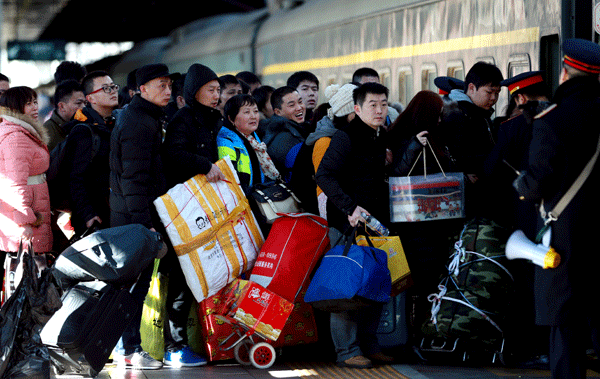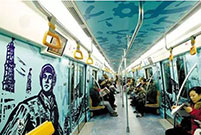

 |
| Passengers wait to get on a train at Beijing West Railway Station on Friday. ZOU HONG / CHINA DAILY |
With no savings and no girlfriend, Tang Shijie said going back to his hometown in Hunan during Spring Festival put a lot of pressure on him.
"But when I got home, my parents didn't ask me about income or relationship. They only cared about whether I was happy and healthy living alone in Guangzhou," said the 30-year-old salesman. "It is nice to have a place that you can always go back to and have people who always love you."
Since 2013, he has been selling razors in Guangzhou, earning about 2,000 yuan ($300) a month.
Another reason he wanted to go home is that almost all of his friends in Guangzhou were returning home, Tang said.
"Buses are empty. Stores are closed. It would be too lonely staying in an empty city," he said. "Spending the holiday at home, on the other hand, gives me a feeling of happiness and comfort."
Record-high travel is expected during the holiday rush ahead of the Year of the Monkey, which begins on Monday.
Between Jan 24 and Feb 2, more than 740 million trips were made in China, an increase of 2.5 percent year-on-year, according to the Ministry of Transport. On Saturday and Sunday, two days before Spring Festival begins, 82 million trips are expected each day.
Beijing West Railway Station has received more than 200,000 passengers daily in the past week, which is twice the flow of regular days. Song Jianguo, the station's spokesperson, said the number set a record.
The intense human traffic comes from the floating population of big cities. According to the National Bureau of Statistics, 38 percent of more than 21.7 million Beijing residents had their household registration in other cities last year.
In Guangzhou, 7.8 million residents don't have a local registration.
Big data released by search engine Baidu revealed that during the Spring Festival migration, people are flowing from big cities to smaller ones, and from coastal areas to inland regions.
Beijing and Shanghai have the largest number of people leaving during this period.
The Ministry of Transport surveyed more than 100,000 travelers during this year's rush and found that 80 percent of trips were made to visit family and friends, and 10 percent were for tourism.
Zhang Enyu, a 28-year-old computer programmer in Shanghai, said he could find a career only in big cities. His hometown, a village in Heilongjiang province, doesn't have any high-tech industry. The trip home takes him nearly two full days: 42 hours by train and three hours by bus.
"The train was so crowded that three or four people would be lying on the floor by my seat," he said. "But I always go home during the festival. For me, the point of Spring Festival is getting together with family."
Pang Wenjing, a 51-year-old migrant worker from the Guangxi Zhuang autonomous region, said he had no money to buy a train ticket but was still eager to go home.
"I am waiting to see if I can find people from my hometown and figure out a way to buy a ticket," he said while looking around at the train station in Guangzhou. "My wife and children are waiting for me."
 Have you ever taken these beautiful subways in China?
Have you ever taken these beautiful subways in China? Chinese beauties, foreign models meet in Chengdu
Chinese beauties, foreign models meet in Chengdu Awesome! Aerial pictures taken on J-11 fighter
Awesome! Aerial pictures taken on J-11 fighter A foreign girl explains what China should be proud of
A foreign girl explains what China should be proud of Chinese navy's air-cushioned landing craft in pictures
Chinese navy's air-cushioned landing craft in pictures Chinese pole dancing master opens class in Tianjin
Chinese pole dancing master opens class in Tianjin Splendid Sichuan after snow
Splendid Sichuan after snow College girl of Vancouver crowned Miss Chinese Int'l 2016
College girl of Vancouver crowned Miss Chinese Int'l 2016 Pentagonal Mart becomes the largest vacant building in Shanghai
Pentagonal Mart becomes the largest vacant building in Shanghai Top 20 hottest women in the world in 2014
Top 20 hottest women in the world in 2014 Top 10 hardest languages to learn
Top 10 hardest languages to learn 10 Chinese female stars with most beautiful faces
10 Chinese female stars with most beautiful faces China’s Top 10 Unique Bridges, Highways and Roads
China’s Top 10 Unique Bridges, Highways and Roads After spate of espionage allegations, US law firm opens first China office
After spate of espionage allegations, US law firm opens first China office Author Feng Tang attacks decision to pull book from shelves
Author Feng Tang attacks decision to pull book from shelves Going ape for New Year
Going ape for New Year Black lungs
Black lungsDay|Week